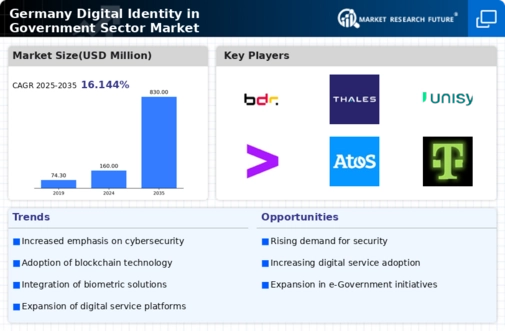Growing Cybersecurity Concerns
Cybersecurity concerns are increasingly influencing the digital identity-in-government-sector market in Germany. With the rise in cyber threats, government agencies are prioritizing the protection of citizens' personal data. A recent survey indicates that 85% of public sector organizations view cybersecurity as a top priority in their digital transformation strategies. This heightened focus on security is driving the adoption of advanced digital identity solutions that incorporate robust authentication methods and encryption technologies. As a result, the digital identity-in-government-sector market is likely to witness significant growth, as agencies seek to mitigate risks and enhance the security of their digital services.
Rising Demand for Efficient Public Services
The digital identity-in-government-sector market is experiencing a surge in demand for efficient public services in Germany. Citizens increasingly expect streamlined interactions with government agencies, which necessitates the implementation of digital identity solutions. According to recent data, approximately 70% of German citizens express a preference for online services over traditional methods. This shift is prompting government bodies to invest in digital identity frameworks that enhance service delivery. These solutions improve user experience and reduce operational costs for government entities. As a result, the digital identity-in-government-sector market is likely to expand, driven by the need for efficiency and accessibility in public services.
Technological Advancements in Identity Verification
Technological advancements in identity verification are playing a pivotal role in shaping the digital identity-in-government-sector market. Innovations such as artificial intelligence and machine learning are being integrated into identity verification processes, enhancing accuracy and efficiency. In Germany, the adoption of these technologies is projected to increase by 40% over the next five years, as government agencies seek to streamline operations and improve user experiences. These advancements not only facilitate faster identity verification but also reduce the potential for fraud, thereby bolstering public trust in digital services. Consequently, the digital identity-in-government-sector market is expected to expand as agencies leverage these technologies to enhance their service offerings.
Legislative Support for Digital Identity Initiatives
Legislative frameworks in Germany are increasingly supportive of digital identity initiatives, which is a crucial driver for the digital identity-in-government-sector market. The German government has introduced various regulations aimed at promoting secure digital identities, such as the eIDAS regulation, which facilitates cross-border recognition of electronic identities. This legal backing encourages public sector organizations to adopt digital identity solutions, thereby enhancing trust and security in online transactions. Furthermore, the government has allocated substantial funding, estimated at €200 million, to support the development of digital identity infrastructure. This legislative support is expected to catalyze growth in the digital identity-in-government-sector market, fostering innovation and collaboration among stakeholders.
Public Awareness and Acceptance of Digital Solutions
Public awareness and acceptance of digital solutions are crucial drivers for the digital identity-in-government-sector market in Germany. As citizens become more familiar with digital technologies, their willingness to adopt digital identity solutions increases. Recent studies indicate that over 60% of the population is open to using digital identities for accessing government services. This growing acceptance is encouraging government agencies to invest in user-friendly digital identity platforms that cater to the needs of the public. Furthermore, educational campaigns aimed at informing citizens about the benefits of digital identities are likely to enhance trust and participation. Thus, the digital identity-in-government-sector market is poised for growth as public awareness continues to rise.
















